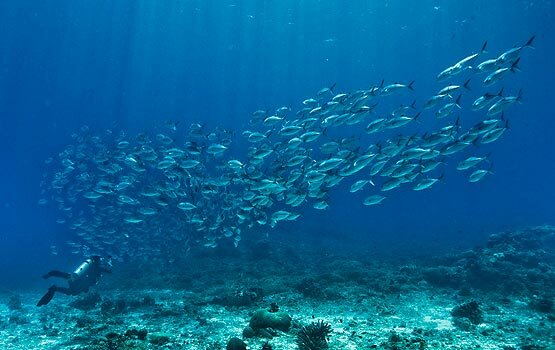The overfishing of the oceans is contributing to global warming, scientists have found.
They have discovered that the ocean’s ability to absorb pollution and purify the atmosphere is influenced by an unexpected factor – fish droppings.

Alkaline chemicals such as calcium carbonate from fish poo can help balance this acid and help to take carbon dioxide out of the atmosphere
The increase in carbon dioxide in the atmosphere not only drives global warming, but also raises the amount of CO2 dissolved in ocean water, resulting in the sea becoming more acid and potentially a threat to sea life.
Alkaline chemicals such as calcium carbonate can help balance this acid and help to take carbon dioxide out of the atmosphere.
Scientists previously thought the main source for this balancing chemical was the shells of marine plankton, but they were puzzled by the unexpected quantities of carbonate in the top levels of the water.
Researchers led by Rod W. Wilson of the University of Exeter, in England, reported in the journal Science that marine fish contribute between 3 per cent and 15 per cent of total carbonate.
The researchers from the United States, Canada and England say the contribution could turn out be even higher.
They say that bony fish, a group that includes 90 per cent of marine species, produce carbonate to dispose of the excess calcium that they ingest by constantly drinking seawater. This forms into calcium carbonate crystals in the gut, and the fish then simply excrete these ”gut rocks.”
The process is separate from digestion and production of faeces, according to the researchers.
The scientists estimated the total mass of bony fish in the ocean at between 812 million tons and 2.05 billion tons, which they said could produce about 110 million tons of calcium carbonate per year.
The carbonate produced by fish is soluble and dissolves in the upper sea water, while that from the plankton sinks to the bottom, the team found.
Dr Martin Grosell of the University of Miami’s Rosenstiel School of Marine and Atmospheric Science said: “Depletion of fish stocks due to overfishing will obviously influence global calcium carbonate production… but the prediction of the impact of overexploitation is complex.
“Smaller fish which often result from exploitation produce more calcium carbonate for the same unit of biomass than bigger fish.”
Scientists say they have only begun to scratch the surface of the subject of the contribution made by fish to healing the oceans, but Dr Jeff Hutchings of Dalhousie University, Canada, speaking at the Sundance Film Festival said that the volume of fish that has been removed from the oceans by man was very large.
For example, the Northern cod which used to live on the Grand Banks off Newfoundland was equivalent in mass to 28 million humans.
“That’s a lot of fish poo,” he said.
![]()



0 Responses to “Fish poo could save the planet”
Leave a Reply